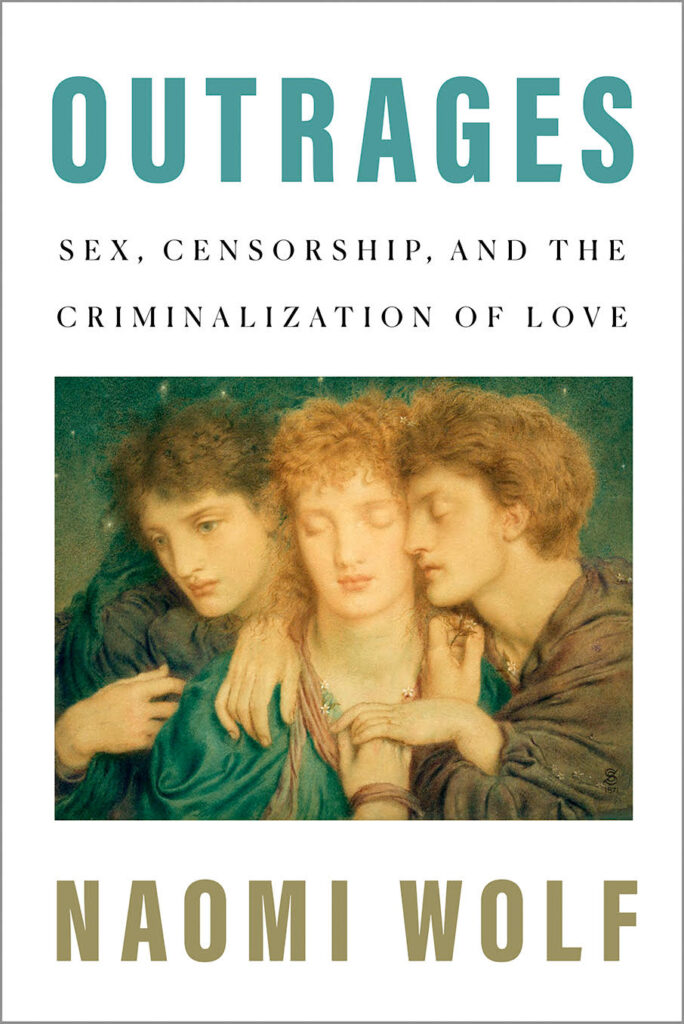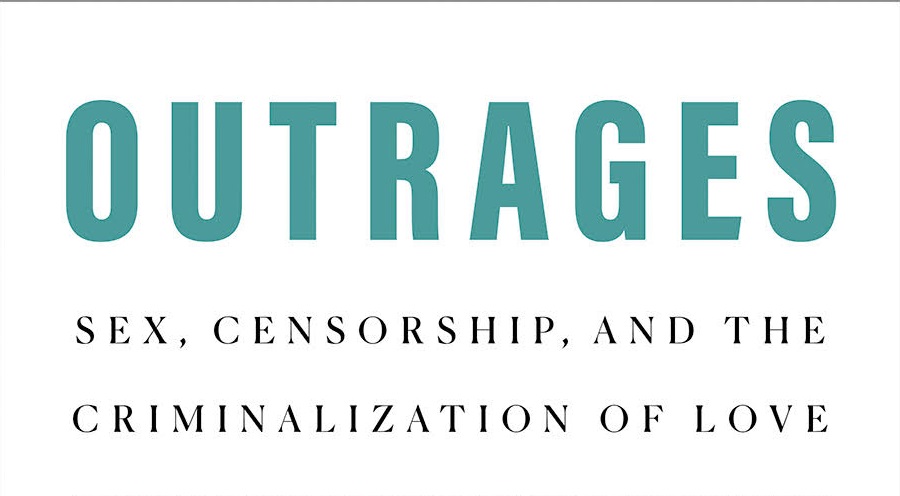Outrages! The New Book from Naomi Wolf
Released for the first time in North America on October 9, Outrages (newly updated and expanded) chronicles the struggles and eventual triumph of John Addington Symonds, a Victorian-era poet, biographer, and critic who penned what became a foundational text on our modern understanding of human sexual orientation and LGBTQ+ legal rights, despite writing at a time when anything interpreted as homoerotic could be used as evidence in trials leading to harsh sentences under British law.
Wolf’s book is extremely relevant today for what it has to say about the vital importance of freedom of speech and the courageous roles of publishers and booksellers in an era of growing calls for censorship and ever-escalating state violations of privacy. At a time when the American Library Association, the Guardian, and other observers document national and global efforts from censoring LGBTQ+ voices in libraries to using anti-trans and homophobic sentiments cynically to win elections, the story of how such hateful efforts, evolved from the past, to reach down to us now, is more important than ever.
“A remarkable and moving work.”
—Larry Kramer, author of Faggots and
The Normal Heart
Drawing on the work of a range of scholars of censorship and of LGBTQ+ legal history, Wolf depicts how state censorship, and state prosecution of same-sex sexuality, played out—decades before the infamous trial of Oscar Wilde—shadowing the lives of people who risked in ever-changing, targeted ways scrutiny by the criminal justice system. She shows how legal persecutions of writers, and of men who loved men, affected Symonds and his contemporaries; all the while, Walt Whitman’s Leaves of Grass was illicitly crossing the Atlantic and finding its way into the hands of readers who reveled in the American poet’s celebration of freedom, democracy, and unfettered love.
Inspired by Whitman, Symonds kept trying, stubbornly, to find a way to express his message—that love and sex between men were not “morbid” and deviant, but natural and even ennobling. He wrote a strikingly honest secret memoir written in code to embed hidden messages—which he embargoed for a generation after his death—and wrote the essay A Problem in Modern Ethics that was secretly shared in his lifetime and is now rightfully understood as one of the first gay rights manifestos in the English language. Equal parts insightful historical critique and page-turning literary detective story, Wolf’s Outrages is above all an uplifting testament to the triumph of romantic love.
Wolf spoke to us briefly and even penned an essay and created a short video to share with our readers. The time for censorship is over – it’s a tool used against us, and in deviously clever hands “Cancel Culture” is making us do the work of the censor.
Today on my Twitter feed, people called to ban the Harper Lee novel To Kill a Mockingbird. Why? Because its depiction of racism made students uncomfortable. When I was at Oxford University as a graduate student, the student union called for Julian Assange, due to speak, to be “de-platformed” – that is, denied a platform to speak – due to accusations against him then of sexual misconduct (he had not yet been tried). At Barnard College, where I was a Fellow, Palestinian students were taken aback when a banner of a map of pre-1948 Palestine – just a map – was removed, with the then-President’s support; students had complained that it made them – yes – “uncomfortable.”
On social media, calls are rife to close down or censor various commentators, publications or events; for sins ranging from allegedly being mean to staff (talk show hostess Ellen DeGeneres) to inappropriate or offensive comments. These calls have their own new term: “cancel culture”. Merriam-Webster defines this as withdrawing of support for a public figure due to something problematic he or she said or did in the past.
I want to issue a warning about “cancel culture,” and create a bright line distinguishing boycotts from actual censorship. The two actions are being dangerously blurred today.
I am a big believer in boycotts; I called for the use of them as a political action tool in my 1990s book about rekindling feminism, Fire with Fire. Boycotts are great for speech: in a boycott you call attention to what you oppose – including racist, sexist, homophobic or transphobic practices – and you withdraw consumer support. You meet bad speech with more speech; you shine a light.
What’s happening now, though, with “cancel culture,” is going far beyond traditional calls to boycott. Today’s “cancel culture” often cracks down on speech itself; it seeks to drown out the “offensive” speaker, or to crush his, her or their chance to use language to reach others. Sadly, this new form of censorship, dressed in “woke” clothing, is more often levied from the left these days than from the right (and I say that with regret, as member of the left). The Brooking Institution found that a surprising percentage of college students qualify their support for the First Amendment, and believe that it is acceptable to shut down speech that may be “offensive.”
This trend is a shameful abdication of the historical role of the left of championing freedoms of speech. It was the left that supported famous banned or censored books such as D H Lawrence’s Women in Love, and Allen Ginsberg’s homoerotic poem Howl; traditionally it has been the right that sought to censor in the name of “family values” or religion. The censor’s political stance is disastrously now reversed.

My new book Outrages: Sex, Censorship and the Criminalization of Love – which, ironically enough, librarians were asked to destroy last Spring — explains how modern censorship was invented.
Having documented the history of censorship, I assure you: censorship never works. It’s an atavistic, irrational instinct, to deal with speech we don’t like by trying to snuff it out, choke it out, kill it. But ideas, in fact, simply cannot be killed that way.
In the 19th century, the British state, inspired by the French state’s successful prosecution of the excerpted novel Madame Bovary for the crime of “offending public mores”, invented systemic modern censorship with the passage of the 1857 Obscene Publications Act; thus, ideas that had been merely salacious or marginal or challenging, could now send the writer, publisher and bookseller to prison at hard labour.
Who faced legal challenges? Poets now seen as icons such as Algernon Charles Swinburne; feminists trying to inform women about contraception, such as Annie Besant. America copied Britain, passing what became known as the Comstock Act of 1873. Literary hero Walt Whitman was targeted by the Massachussetts District Attorney; his print run of Leaves of Grass, which included homoerotic poems, was halted.
The hero of Outrages, John Addington Symonds, an early LGBTQ rights pioneer, faced censorship of his advocacy for same-sex love and intimacy, his entire life and career. At 19, he wrote a long love poem to his beloved, a youth he named only as “W”. By 21, he was writing a poem as a frontispiece to that love lyric, disavowing the reality of all that readers would encounter in it. As a graduate student, his letters were used against him by a panel of Magdalen College fellows who punished him for the same-sex orientation that they revealed. As a mature scholar and poet, he saw his academic career derailed by a homophobic critic who assailed his work as being “Greek”, which was a term well understood in the Victorian period as code for male same-sex orientation.
He finally decided that British laws against both speech about same-sex love, and against those sex acts themselves, made his life in Britain impossible; he exiled himself to Davos, Switzerland, as a “respectable” husband and father of four, even as he led an intermittent double life with men whom today we would call homosexual, in Venice. Throughout, and even after he found the love of his life, a gondolier named Angelo Fusato, he sought to embed in his secret memoir, and in his published poetry and even his textbooks for young adult men, coded references to what became known later as “the love that dare not speak its name.”
Outrages shows that censorship never prevailed to kill an idea. Discussion of same-sex love and sexuality was targeted by Victorian legal censors – that, of course, did not kill off homosexuality and lesbianism. Nazis burned “decadent” books; we still read Freud and Jung.
To this day, a substantial number of the most often banned or challenged books on the American Library Association’s list of such books, involve subject matter that shows LGBTQ relationships in a positive light, often to younger readers. These range from a children’s’ book about a pig with two dads, to a book for young readers about gender identity, to one that simply has a gay character who is positively depicted.
That censorship, which arises annually in America, isn’t making any fewer young readers gay, lesbian or transgender.
The fact is, you simply can’t kill ideas by starving them of listeners. But you can kill democracy.
It’s a cliché, but “sunlight is the best disinfectant” is indeed the right approach, as history shows us, to take in dealing with what we see as bad, toxic or corrupt speech and ideas.
We need to insist on the primacy of free speech once again when educating the next generation, and remind ourselves of its importance in public debate, as emotionally tempting as “cancel culture” is in the short term.
If we don’t, “cancel culture” will, as it always does, in whatever historical guise in which it appears, eat its young; that is, silencing others always eventually silences us all.
Naomi Wolfe
Dr Naomi Wolf received a D Phil Degree in English Literature from the University of Oxford in 2015. Dr Wolf taught Victorian Studies as a Visiting Professor at SUNY Stony Brook, received a Barnard College Research Fellowship at the Center for Women and Gender, was recipient of a Rothermere American Institute Research Fellowship for her work on John Addington Symonds at the University of Oxford, and taught English Literature at George Washington University as a visiting lecturer.
She’s lectured widely on the themes in Outrages: Sex, Censorship and the Criminalization of Love, presenting lectures on Symonds and the themes in Outrages at the Ashmolean Museum in Oxford, at Balliol College, Oxford, and to the undergraduates in the English Faculty at the University of Oxford. She lectured about Symonds and Outrages for the first LGBTQ Colloquium at Rhodes House.
Dr Wolf was a Rhodes Scholar and a Yale graduate. She’s written eight nonfiction bestsellers, about women’s issues and civil liberties, and is the CEO of DailyClout.io, a news site and legislative database in which actual US state and Federal legislation is shared digitally and read and explained weekly. She holds an honorary doctorate from Sweet Briar College. She and her family live in New York City.
Head here to buy this stunning book! $19.95 USD • $28.95 CAD








Pingback: Censorship, today's 'cancel culture,' never works - Naomi Wolf